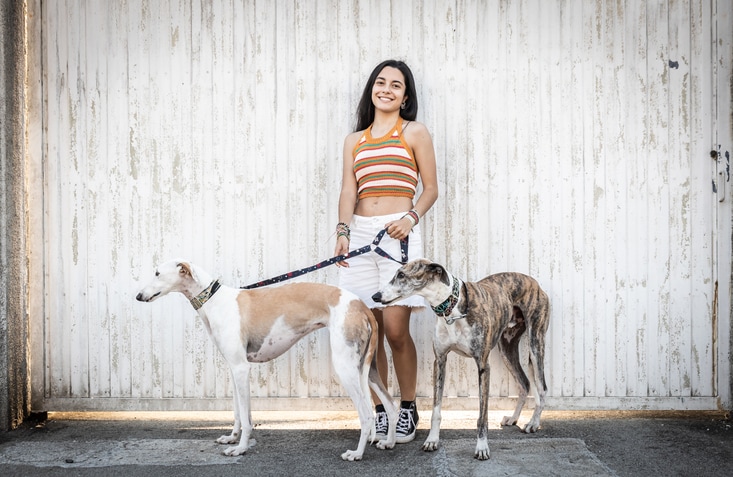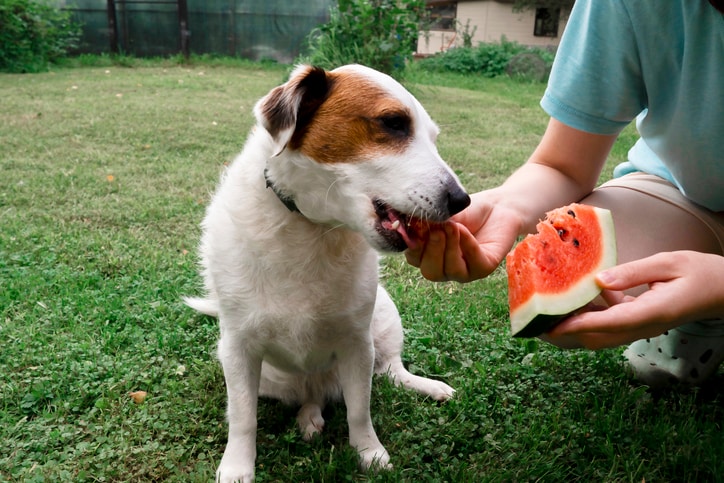Taking your dog on daily walks is a proven way to keep them happy and healthy, but our jam-packed schedules can sometimes make it hard to find time in the day. Enter the dog walker, a canine companion who will step in to step out with your pooch, whether they just need a midday potty break or intense exercise and training.
To ensure your pup is in safe hands, it’s important to interview any potential dog walkers in person — ideally with your dog present. Be prepared with a list of questions that address any concerns you have before officially hiring your new dog walker. But most importantly, observe how they interact with your dog.
“It’s important that a dog walker has a passion for pets,” says Dr. Danielle Bernal, a veterinarian with Wellness Pet Company, acknowledging that you want to hire someone who can ensure your pet is happy and healthy when you’re not around. “Other important skills include basic animal training knowledge, road sense and caution, and, of course, care and empathy.”
Here are seven questions to get you started when interviewing a potential dog walker.
1. “Tell me about your experience as a dog walker. How long have you been doing it? Is this a full-time job for you?”
Along with specific questions — such as what training they have, professional organizations they belong to, and what’s included in their services — dog trainer Joan Hunter Mayer of The Inquisitive Canine in Santa Barbara, California, suggests asking more open-ended questions such as what makes them unique and what they love about their job.
Also, inquire about specific situations and challenges that they may have dealt with, such as aggressive dogs or dogs attempting an escape. “Ask what the person would do if the animal seemed scared or apprehensive about spending time with that person,” Mayer says. “Would they force the dog to do something? Or, would they read the animal’s body language and work at their level, being gentle and kind, taking time to earn the animal’s trust?”
“Depending on your dog’s temperament, you might prefer group walks, or you might prefer individual walks.”
— BEN DOYLE, PET CHECKERS
2. “Will you walk my dogs with other dogs?”
Ben Doyle of Pet Checkers, a UK-based pet care company, notes that many dog walkers walk as many dogs as they can to earn as much money as possible, while others offer individual walks. “Depending on your dog’s temperament, you might prefer group walks, or you might prefer individual walks.”
3. “What does the walk consist of?”
A walk should be fun and fulfilling for your pup — and you know that a quick clip around the block is a lot less enjoyable for them than a meandering stroll that allows them to sniff and explore. Ask about details such as how long the walks will be, routes that will be taken, and equipment that will be used on your dog (like a harness or slip lead).
You’ll also want to ask whether the person you’re interviewing will always be walking your dog or if they work with other dog walkers.
4. “What are your policies around cancellations and rescheduling?”
Things come up and schedules will change — both for you and your dog walker. The dog walker should have a clear procedure in place so that no one is left scrambling at the last minute. This is a good time to ask about their policies surrounding inclement weather as well.
“Every dog walker should have liability insurance.”
— BEN DOYLE
5. “Are you licensed and insured?”
“Every dog walker should have liability insurance,” Doyle says. “Thankfully, this has never happened to us, but we know owners suing dog walkers to recover the cost of medical bills because a dog was injured in their care. As a dog owner, you’ll feel better knowing that you can recover any medical costs from the dog walker’s insurance company in the event that something happens.”
6. “What sort of paperwork do you require?”
According to Doyle, a professional dog walker should have two key forms for you to sign: general terms and conditions that lay out your contract, and a veterinary release form. “This sets out what your dog walker will do in the event that your dog needs to see the vet. It discloses whether or not your dog is insured, authorizes how much you’re happy to let them spend at the vet if they’re not insured and can’t get hold of you, what to do in the event that your dog needs to be euthanized. It’s not a nice form, but necessary.”
7. “Can you provide references?”
As with any hire, past employers can tell you a great deal about a potential dog walker. “A good dog walker should have lots of happy customers,” Doyle says. “Ask them if you can speak to one or two of them, and get feedback firsthand.”
If the potential dog walker struggles to answer any of the questions you’ve asked, recognize that they may not be the best fit for your needs, Mayer says.
Some other warning signs:
- Not making eye contact.
- Poor communication.
- Any action that might frighten the animal.
- Your dog never warms up to the person, doesn’t want to take treats from them, or displays body language that he or she might be fearful of them.
In short, trust your instincts — and your dog’s. In this case, they’re not likely to steer you wrong.


